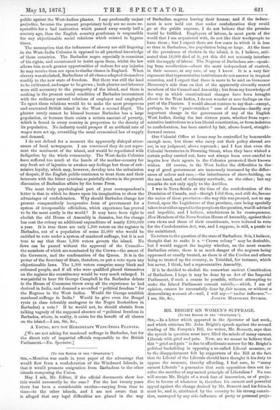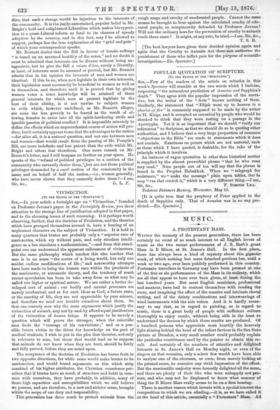MR. BRIGHT ON WOMEN'S SUFFRAGE.
[TO THR EDITOR OF THE " SPECTATOR:1
SIR,—In a letter which appeared in the Spectator of last week, and which criticises Mr. John Bright's speech against the second reading of Mr. Forsyth's Bill, the writer, Mr. Bennett, says that the speech in question must have filled the minds of many earnest Liberals with grief and pain. Now, are we meant to believe that this "grief and pain" is due to affectionate sorrow for Mr. Bright's political backsliding in opposing a so-called Liberal measure, or to the disappointment felt by supporters of the Bill at the fact that the Liberal of the Liberals should have thought it his duty to oppose the measure, thereby affording, I feel sure, to "many earnest Liberals" a guarantee that such opposition does not ia- volve the sacrifice of any sacred principle of Liberalism? No one. will accuse Mr. Bright of a weak fear of innovation, or of preju- dice in favour of whatever is, therefore his earnest and powerful appeal against the change desired by Mr. Bennett and his friends must be, and is, attributed by the country to his strong convic- tion, unswayed by any side-influence of party or personal prejn-
dice, that such a change would be injurious to the interests of the community. It is the justly-entertained, popular belief in Mr. Bright's bold and enlightened Liberalism which makes his opposi- tion to a quasi-Liberal reform so fatal to its chances of speedy adoption by the country, and in this fact, may I be allowed to suggest, perhaps lies the true explanation of the "grief and pain" of which your correspondent speaks. Mr. Bennett denies that the Bill in favour of female suffrage "is based on an assumed hostility of the sexes," and no doubt it must be admitted that interests can be diverse without being an- tagonistic, but to give the Bill a raison d'être, surely a diversity, at least, of interests must be assumed or proved, but Mr. Bennett admits that in his opinion the interests of men and women are identical. If this be so, when men legislate in their own interests, their legislation must necessarily be beneficial to women as well as to themselves, and therefore until it is proved that by giving women votes a truer knowledge will be attained of those general interests for which men at present legislate to the best of their ability, is it not unwise to subject women to evils which, however undefined, as Mr. Bennett alleges, are none the less gravely to be feared as the result of al- lowing females to enter into all the spirit-hardening strife and ignoble passion of political conflict? It is impossible minutely to define the effects which an unprecedented course of action will pro- duce, butit certainly appears to me that the advantages to the nation —for after all, it is a national question, and not one between men and women—that would result from the passing of Mr. Forsyth's Bill, are more indefinite and less patent than the evils which Mr. Bright and others fear therefrom. One more remark on Mr.
Bennett's letter, and I will trespass no further on your space. He speaks of the "refusal of political privileges to a section of the community who earnestly desire them,",,but are not these political privileges demanded by a small section of the community in the name and on behalf of half the nation,—i.e., women generally, who have never shown that they earnestly desire them ?—I am,



































 Previous page
Previous page